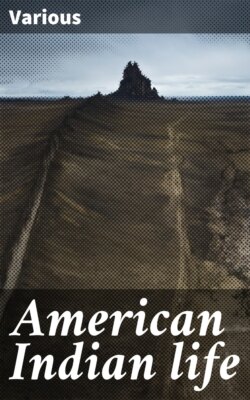Читать книгу American Indian life - Various - Страница 10
На сайте Литреса книга снята с продажи.
IV
ОглавлениеTable of Contents
Shinbone had come home from a war party with blackened face and taken the rank of chief. No wonder, the people were saying. Had not the Thunder-bird adopted him when as a young man he prayed and thirsted for a revelation? Men must undergo suffering if they wanted supernatural blessing so that they could become great men among their people. Of all the Crow chiefs, only Drags-the-wolf had been in luck: him the Moon visited as he was peacefully slumbering in his tent and granted him invulnerability and coups. The other distinguished warriors had had to mortify their flesh in order to gain favor.
That spring the herald proclaimed that Red-eye was going to hold a Sun Dance. He had lost a brother and was hungering for revenge. What surer way to attain it than to fast and dance before the sacred doll till it became alive and showed him a scalped Dakota in earnest of victory and vengeance? But Red-eye’s announcement was a signal for all the ambitious youths to plan for a public mortification of their flesh at the same time in the hope of winning supernatural favor. So, while the pledger of the ceremony was dancing up and down with his gaze riveted on the holy image in the rear of the lodge, a dozen young men were undergoing torture for their own ends. Some were dragging through camp two buffalo skulls fastened to a stick thrust through holes cut in their backs. Others—and Takes-the-pipe among them—decided to swing from the lodge poles. So he begged Sharp-horn to pierce the flesh above his breasts, run skewers through the openings, and tie the rods to ropes hung from a pole. Thus attached he ran back and forth till he had torn out the skewers. Yet when he had fallen to the ground faint and bloodstained no vision came for all his pains.
He wanted to become a chief like Shinbone, so he went on a mountain peak to fast. Without clothes save his gee-string and a buffalo robe, he slept there overnight. He awoke early, the sun had just risen. He took a piece of wood and put on it his left forefinger. “Sun,” he cried, “I am miserable. I am giving you this. Make me a chief!” With a huge knife he hacked off the first joint. The blood began to flow. He lost consciousness. When he came to, it was evening. His finger ached. He tried to sleep, but the pain and cold kept him awake. Of a sudden he heard a man clearing his throat and a horse’s neighing came closer and closer. A voice behind him said, “The one whom you wanted to come has arrived.” He turned about. He saw a man on a bay horse; his face was painted red and he wore a shirt with many discs cut out from its body, yet hanging from it as though by a thread. From the back of his head rose a chicken-hawk feather. The rider said, “You are miserable. I have been looking for you for a long time but could never quite reach you. I will adopt you as my child. Look! I am going to run.” He began to gallop; the dust flew to the sky. Then the trees and shrubs all about turned into Piegans began shooting at the horseman. Arrows came whizzing by him and bullets flew round him and the enemies were yelling after him, but he wheeled round unscathed. With his spear he knocked down one warrior and counted coup on him. He rode up to Takes-the-pipe: “Though you fight all the people of the world, dress as I do and you need have no fear of death before you are a chief. That man I struck is a Piegan; you have seen his country, go there, I give him to you. As I am, so shall you be; arrows will not hurt you, bullets you can laugh at. You shall be like a rock. But one thing you must not do: never eat of any animal’s kidneys.”
When Takes-the-pipe got back to his people, he was very glad. Two things remained to be done before he might call himself chief: one was to lead a victorious war party, the other to cut a picketed horse. His vision enabled him forthwith to play a captain’s part. He shot a chicken-hawk and took one of its feathers to be worn at the back of his head on his expeditions. He prepared a shirt like the one he had seen and a spear that resembled exactly that borne by his patron. Then he gathered his war party. His sisters and other Sore-lip women made moccasins galore for him. He set out in the dead of night. For several days they traveled north and west. On the Missouri they ran into a few Piegans in a hunting-lodge. They killed them all and took their scalps. Thus they could return with blackened faces. One of the enemies had a thumbless hand, so the year was known ever after as “the winter when they killed the thumbless man.”
